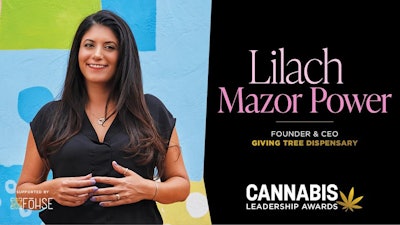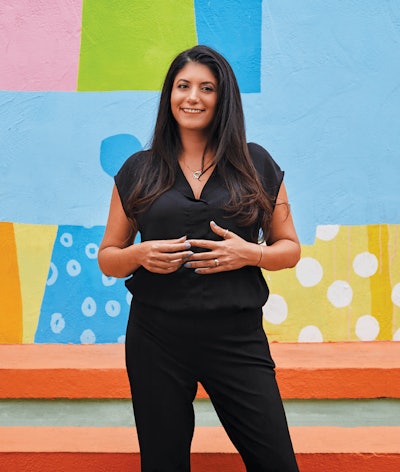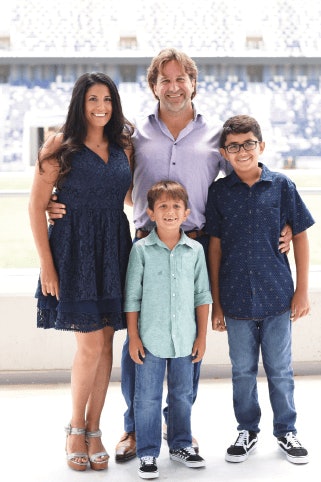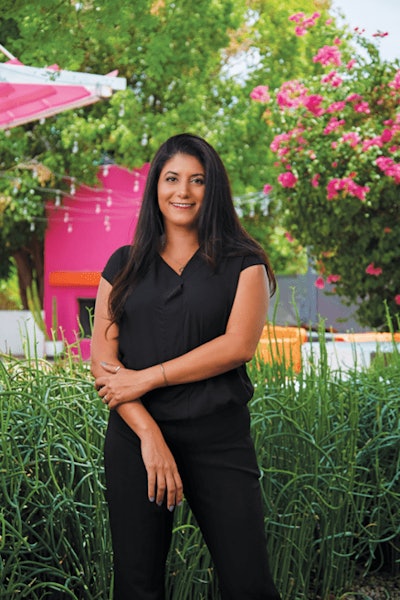

As the founder and CEO of one of the few majority- woman-owned cannabis companies in the country, Lilach Mazor Power has always been a go-getter.
The successful entrepreneur leading the Giving Tree Dispensary doesn’t shy away from a challenge. Lilach has embraced the positive potential of risk-taking throughout her life, which has led her to have several breakthroughs throughout her career.
It’s that hopeful sense of adventure that drove Lilach to open a wellness center to help people battling chronic illnesses through using holistic medicine and medical cannabis, which has now become one of the longest operating cannabis companies in Arizona.

Growing up
Lilach, born and raised in Israel, says growing up there “is kind of like the same rollercoaster as [being] an entrepreneur.”
While she explains the country has a lot to offer regarding its beautiful scenery, excellent education, and tight-knit communities, it faces challenges with border and security threats, causing many civilians to live in uncertainty, which helped build her risk tolerance, she says.
“At times, [living in Israel] could be stressful, which I think makes Israelis very risk-tolerant because they are living every moment like it’s their last one,” she says.
Lilach grew up the second out of four girls in a traditional household. Her parents, Yossi and Flori Mazor, whom she describes as “supportive and warm,” raised all four women with the philosophy that they could do whatever they set their minds to.
“They shaped all of us,” she says. “First of all, there was never an excuse or teaching that as a girl, there are things you can’t do. My mom’s mantra was ‘always be able to walk away the same day,’ which taught us independence. She always said, ‘Never get to the point in life if you want to leave, you can’t for any reason in the world. Always make sure you are independent enough to get up and change the course of your life.’”
Lilach says her parents encouraged her and her sisters to go to college, earn a degree, and then work in that field of study.
Although she says “studying wasn’t really her thing,” she pushed through and earned a bachelor’s degree in business and marketing from the New England College branch in Tel Aviv before officially moving to the United States at 26 years old.
Building Her Path
Shortly after she moved to the U.S., she met her husband, Keith Power, who works as an emergency room doctor.
The frequent conversations that she and her husband had about his work and recurring ER visits from patients with chronic conditions drove her idea to open a wellness center, she says.
“My husband kept telling me stories from the ER about how people keep coming with chronic issues, but Western medicine is not able to find a solution for them,” she says. “And I kept thinking, ‘I wonder why people are not trying other things. If these people keep going to the ER and getting the same results, why don’t you try something else?’ It could be yoga, meditation, or acupuncture. ... It’s worth trying.”
She envisioned a center that would offer alternatives, creating a “safe place for physicians, therapists, and people to talk about different methods to get to that holistic approach.”
Lilach developed a business plan for the wellness center in 2009 but eventually tabled the idea after she realized she couldn’t cover the launch and operational expenses.
Shortly after, in November 2010, medical cannabis came up on the ballot in Arizona, she says. “I thought, ‘Well, perfect. If this is going to work here, then [cannabis] could be part of the whole wellness center, and then this would probably fuel the wellness center financially,’” she says.
While incorporating cannabis in the wellness center was not a part of her initial plan, Lilach says she has always believed in the wellness and medical properties of cannabis. “Because I grew up in Israel, a country that started cannabis research back in the ’60s, it felt like a natural add-on to the typical wellness offerings,” she says.
She applied for a medical cannabis production license in 2010, but Lilach faced several challenges when working to open the wellness center, most notably with acquiring capital.
“When we started, we were trying to raise $300,000, which is nothing in today’s world, but no one wanted to give us money,” she says. “People were just not interested in investing in cannabis. It was very different raising capital back then.”
Lilach also struggled to find experienced professionals to come work for her, as people did not want to leave their current careers to work in cannabis, or they didn’t want it on their resumes, she says.
The team posted job openings on a variety of websites, such as ‘Farm Jobs’ and university websites that had agriculture programs, she says.
“We created a culture of curiosity and didn’t accept the ‘because that’s just how it is done,’ mentality,” she says. “We wanted a group of curious minds who wanted to prove theories and understand why some things worked and others did not. We recruited fresh college grads and experienced agronomists to work side-by-side with skilled growers. The diversity of our team aligned with our company vision to continue improving and changing.”
In regard to raising capital, the company is self-funded. “Every penny that we earn, we reinvest,” she says.
Lilach secured her medical cannabis license in 2011, started the buildout in 2012 and officially opened the Giving Tree Wellness Center in 2013 in Phoenix.
“From the beginning when she got into the cannabis industry, there were risks from there,” says her husband, Keith. The couple also has two children, 11-year-old Shai and 7-year-old Ben, adding to the concerns and complexities of the new venture. “It made me anxious because cannabis at the time was still questionable,” Keith recalls. “We heard stories of certain individuals or federal raids and things along those lines, but she continued to go with those risks because she had her beliefs in the wellness center and that cannabis can be a part of that wellness center, and it would help people.”
The center included a medical cannabis dispensary and holistic medicine approaches like massage, yoga, reiki, support groups, and more; however, Lilach says it didn’t take off as much as she expected it to.
“People who try cannabis often become consumed by the cannabis journey, and they become less interested in exploring other holistic treatments because of the multifaceted and dynamic nature of the cannabis plant,” Lilach says. “I also think our location, which was an industrial area, played a large part in having less consumer foot traffic at the wellness center. People don’t want to drive to an industrial park to get a massage, and I understand why. But at the time, dispensaries were relegated to industrial areas because of zoning and permitting.”
In 2017, the wellness center closed, but the dispensary remained.

“That was a tough year,” says Lisa Vander Jagt, human resources manager at Giving Tree Dispensary. “You would have never known from [Lilach’s] demeanor what she actually was going through that year. I knew because I worked very closely with her, but she didn’t really show that to anybody else. She just kept going, even though I knew she was dealing with a tremendous amount of stress; she did it with a lot of grace and dignity and just kept her head down and kept going.”
The team managed to keep most of their employees at the time and had no forced layoffs, Vander Jagt says.
Once the wellness center closed, Lilach shifted gears and focused on the cannabis side, opening the Giving Tree Dispensary, a vertically integrated cannabis company, with retail and production under one roof.
A New Life for the Giving Tree
Giving Tree has now become one of the longest-standing cannabis companies in Arizona, selling medical cannabis since 2013.
The dispensary received its license to sell adult-use cannabis on Jan. 22, 2021, just over two months after Proposition 207 passed in Arizona, legalizing adult-use cannabis in the state.
Upon Giving Tree receiving its adult-use license, it expanded to a new retail location, also in Phoenix, in late January 2021 and began selling recreational cannabis products the same week.
Since then, the company has more than doubled its retail staff and currently employs 59 employees, including 10 in cultivation, six in extraction, and 27 in retail, Cannabis Business Times previously reported.
Vander Jagt described Lilach as “self-confident, tenacious, and kind-hearted,” and says she will do anything for her employees.
“If any of her employees are struggling or if they’re having a personal issue or whatever they have going on, she will do whatever she can to help that employee, which is unusual, at least I think in the work environment,” Vander Jagt says.
“For example, we had an employee who lost her mother to cancer after a long battle,” Vander Jagt shares. “The employee had to clean out her mom’s house, which was very difficult on her, so Lilach sent in a cleaning crew so she would not have to deal with that on top of planning a funeral and wrapping up her estate.”
Keith says he thinks his wife’s devotion to her team represents her leadership in the cannabis industry.

“What I always find very inspiring about her is that every time she talks about her team and employees, she wants them to succeed and do well, and she becomes frustrated when they don’t take that next step to improve themselves or to get to the next level,” he says. “She really takes pride in every one of the team members that she works with and wants to see all of them succeed, even if that comes to the point where it’s not with her own company.”
In addition to her devotion to the company and her employees, Lilach is dedicated to providing patients with the highest quality care and medicine, Vander Jagt says.
For instance, when one of the dispensary’s flower strains that was popular amongst consumers started growing seeds, Lilach opted to destroy the crop.
“We lost a significant amount of money,” Vander Jagt says, “but she never has, and she won’t compromise on her quality. It’s very important to her that we continue to maintain our high-quality standards, and [I think] that would speak to ... how she runs her business.”
“She’s shown that as a small business, she can still stay viable and not get gobbled up by the big corporate culture and continue to produce great products and stay true to her core values ...” Lisa Vander Jagt, Human Resources Manager, Giving Tree Dispensary
Lilach is also passionate about the community and has created charitable efforts on behalf of the company, raising more than $100,000 for charities. Some of these include participating in walks or organizing races to raise money for Breast Cancer, Crohn’s Disease and Ulcerative Colitis, and working with the Pat Tillman Foundation, an organization that supports military veterans.
Vander Jagt says throughout the past five years she’s been with the company, Giving Tree had participated in or organized three charitable events a year until the COVID-19 pandemic hit.
The Giving Tree also has worked with Streetlight USA, an organization that provides housing for victims of child sex trafficking, Vander Jagt says. “We went there and re-did their whole backyard and put in vegetable gardens and landscape for them to spend time out there,” she says.
These are just some of the community outreach projects the Giving Tree has participated in, and Vander Jagt says the company plans to participate in more events once it’s safe to do so.
“She’s done a lot to promote the face of the industry, not only from the charitable aspect but also from a growth aspect,” Vander Jagt says. “She’s shown that as a small business, she can still stay viable and not get gobbled up by the big corporate culture and continue to produce great products and stay true to her core values, and I think that’s important.”
Looking Ahead
Lilach says throughout the past nine years of being in the cannabis industry, her team and every touchpoint through her journey have influenced her to change and become more of a coach.
For the first time, Lilach says she is working on hiring an executive leadership team, which consists of five key positions: marketing, sales, human resources, production and finance.
“It’s definitely going to help the business. My team is under-supported because I’m trying to [wear] those five hats,” she says. “And that means I’m trying to do the work of five people, but it’s impossible. So, I’m filling [the positions] because I’m not supporting [the team]. So, I think this will be a great change for the business because the team will have that mentorship dedicated to them in each of those key positions.”
Lilach says this is something that she has been working on for a while: hiring others to make decisions and run the business.
“We created a culture of curiosity and didn’t accept the ‘because that’s just how it is done,’ mentality.” Lilach Mazor Power, Founder and CEO, Giving Tree Dispensary
“I’m ready to let go and trust someone else to do this better than I am,” she says. “And they will, I have no doubt. So, that has been kind of a work in progress. That also was kind of an epiphany [I had]. A year ago, I felt like I would fail everyone, including the business, if I’m not going to get help and get the right people in the right seat to [move] this company forward; that is something I’ve been working on.”
Lilach has currently filled three of those five seats and is hoping to have all five positions filled by the end of October to focus on being a coach and “continue to create cool, unique brands, get them out into the market, and then make baby exits,” rather than make everyday decisions.
Vander Jagt says the team has bought into that vision. “A lot of people she has [working for her] believe in her vision and are willing to follow her,” she says, as 10 of the employees have been with the company for five or more years.
“I have a great team right now, and that just speaks to her being present in meetings, talking with the team and sharing what her vision is and where she sees the company going,” Vander Jagt says.
Regardless of whether others believe in her, Lilach has no doubts about her abilities to lead a team through the complex realities of the cannabis industry.
“I think the biggest accomplishment is learning how to silence the noise and believe in yourself,” Lilach says. “And know that as a woman, you’ll get it more than others, where people will doubt you and tell you how it’s not going to work. [Those people] will always be there. But you have to know that sometimes the crazy ideas and believing in yourself and believing in what you’re doing is what will get you there.”
















